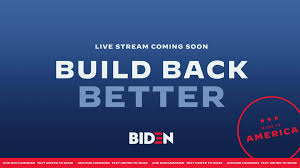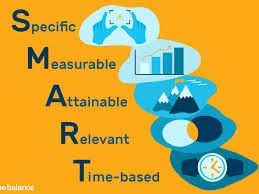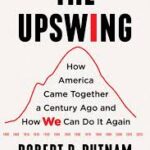
Beyond the Election
This fifth and final installment in a series of blog posts on Imperative 21’s plan for resetting the American and global economies should go out with a bang. In it, I should be able to talk about how we can turn those dreams into realty. Instead, I’m afraid I have to disappoint you with a wishy washy message. We can make some progress in the months to come, but we will have to take at least three other, significant steps before we can truly achieve what the Imperative 21 team calls an economic reset.
Before digging in, I should also note the obvious. I wrote this post during the final two weeks of the 2020 American presidential election campaign. The timing is a coincidence that wasn’t planned by either the Imperative 21 team or me. Their launch coincided with the fiftieth anniversary of the publication of Milton Friedman’s (in)famous New York Times magazine article on shareholder responsibility. It then took me six weeks to write all of these blog posts.
 In any event, I’m glad the timing worked out the way it did, because this final post in the series also allows me to present my take on the election whose results will go a long way toward determining how we go about turning the abstract Imperative 21 mandates into reality.
In any event, I’m glad the timing worked out the way it did, because this final post in the series also allows me to present my take on the election whose results will go a long way toward determining how we go about turning the abstract Imperative 21 mandates into reality.
It is not my job to tell you how to vote, although if you know my work at all, you won’t have any trouble guessing whom I will be voting for.
Rather, I want you to see that we will face momentous challenges no matter who wins on November 3.
In fact, whatever happens, we will face an uphill struggle because the individuals and organizations who have doubts about our ability to design for the future, invest in social justice, and be accountable to all stakeholders are powerful indeed.
Nonetheless, I will use to the rest of this post to show you some first steps we can take as a society and, more importantly, you can take as an individual.
Washington 2021
I’m going to start in a way that might seem to contradict what I just said.
The elections are important. However, I don’t expect to see the government take dramatic policy shifts toward the Imperative 21 policy goals whoever wins.
I italicized those whoever wins in the previous section for a reason. While I do think that whoever wins in November will make a huge difference, it will not propel us very far or very fast toward Imperative 21’s goals.
It is safe to assume that any newly elected government will make some non-trivial changes in the post-pandemic world, whenever and however we get there. That’s the case because pretty much everyone agrees with the sentiment embodied in a phrase first used in the development community which has since been taken over by such different political leaders as Boris Johnson and Joe Biden–build back better.
A Biden administration with a democratic majority in the Senate will almost certainly enact policies that point us in the directions toward the first two imperatives, for example:
- Design for the future by rejoining the Paris Agreements and doing a lot more to combat climate change
- Invest in social justice by addressing systemic racism in law enforcement, expanding access to health care coverage, and more
 There are also some areas in which a second Trump administration might outpace the democrats despite the o outgoing government’s failure to carry out most of its grassroots oriented economic policies. In particular, Republicans have gone a lot farther than democrats in introducing empowerment zones that should ultimately benefit people of color and other currently underserved communities.
There are also some areas in which a second Trump administration might outpace the democrats despite the o outgoing government’s failure to carry out most of its grassroots oriented economic policies. In particular, Republicans have gone a lot farther than democrats in introducing empowerment zones that should ultimately benefit people of color and other currently underserved communities.
At the same time, I’m convinced that neither party could be expected to make much explicit progress toward the three imperatives in the flurry of action that is likely to occur after the presidential inauguration in January. Slogans like build back better are just that, slogans that do not have much “meat on their bones” yet.
 There are many reasons why that’s the case. Near the top of any such list is both parties’ reluctance to use the kind of “big picture lens” look that the Imperative 21 team employed in analyzing what is wrong with the status quo. As a result, it is hard for them to come up with an integrated approach to rebuilding the economy after the COVID-19 pandemic ends in ways that also addresses our country’s and the planet’s unmet needs. That’s especially true of the third imperative—being accountable to all stakeholders—which almost never appears in either party’s list of even long term goals.
There are many reasons why that’s the case. Near the top of any such list is both parties’ reluctance to use the kind of “big picture lens” look that the Imperative 21 team employed in analyzing what is wrong with the status quo. As a result, it is hard for them to come up with an integrated approach to rebuilding the economy after the COVID-19 pandemic ends in ways that also addresses our country’s and the planet’s unmet needs. That’s especially true of the third imperative—being accountable to all stakeholders—which almost never appears in either party’s list of even long term goals.
That’s a wordy way of saying that they have not set what organizational theorists call SMART goals—specific, measurable, agreed-upon, realistic, and time driven, In the end, these will be key to developing the metrics against which we will both measure our success and determine that everyone’s interests and needs are being met.
Yet, we are even farther away from enshrining SMART goals or stakeholder accountability as central tenets of American public policy. We can get there, but we’ll have to turn our attention away from Washington first.
Beyond Washington
When I was in graduate school in the late Middle Ages, I had to specialize. As a result, I didn’t have time to take some courses that could have directed me toward peace studies earlier in my career, including ones by Robert Axelrod on modeling complex systems.
For the purposes of this post, however, I should have spent more time with the late Jack Walker who was then doing pathbreaking research on state governments. I read his papers in some of my other courses and poo-pooed his idea that states often acted as laboratories in which policy makers try out new ideas that only later make it onto the national agenda.
I find myself returning to his ideas (with some metaphorical egg on my face) frequently twenty years since his untimely death in an automobile accident when he was only in his mid-fifties.
We all know about California’s role in setting state environmental standards that become national because the state is so big. Most political scientists recognize that the Affordable Care Act (aka Obamacare) was based heavily on policies adopted in Massachusetts when Senator Mitt Romney was that state’s governor.
Had he lived, Walker would have seen that he had only scratched the surface and would have seen that innovations emerge at other sub-national levels, too.
Many of them take the form of public private partnerships and began when for profit companies began to take the kinds of steps Imperative 21 had in mind, often in the communities in which they work and/or are based. Because I’ve spent much of my career in higher education, I’m drawn to ones in which colleges and universities invest in their local communities. Oberlin (where I went as an undergraduate) and Colby (where I spent the first sixteen years of my teaching career) have invested tens of millions of dollars from their endowments in rejuvenating their local communities in ways that will benefit both “town and gown” in due course. George Mason University (where I now have a research appointment) has long been known for its role in co-creating the entrepreneurial spirit of Northern Virginia’s technological companies and is now actively engaged in dealing with region’s social, economic, and environmental problems. It’s not just GMU. In their 2018 book on small cities that “work,” Our Towns, James and Deborah Fallows invariably found that local colleges and universities invariably played a pivotal role in the dozens of local turnaround stories they documented.
 Sometimes, government isn’t involved in the initial stages of these efforts that begin wholly in the private sector. Salesforce is perhaps the best known of the large corporations that have unilaterally decided to take steps to deal constructively with climate change, systemic racism, and dozens of other problems. Since its creation in 1999, the company and its founder Marc Benioff have found themselves on the front lines as I laid out in a review of his most recent book, Trailblazer. From day one, it has followed what Benioff calls its 1-1-1 rule. It goes beyond the money. Everything the company and its employees do is anchored in a series of core values that are also integral to Imperative 21’s mission.
Sometimes, government isn’t involved in the initial stages of these efforts that begin wholly in the private sector. Salesforce is perhaps the best known of the large corporations that have unilaterally decided to take steps to deal constructively with climate change, systemic racism, and dozens of other problems. Since its creation in 1999, the company and its founder Marc Benioff have found themselves on the front lines as I laid out in a review of his most recent book, Trailblazer. From day one, it has followed what Benioff calls its 1-1-1 rule. It goes beyond the money. Everything the company and its employees do is anchored in a series of core values that are also integral to Imperative 21’s mission.
 We’ve barely scratched the surface of what can be done at the grass roots level in ways in which established institutions like governments and colleges only play a minor and supporting role. Two examples should be enough to illustrate this point and serve as an intellectual bridge to the next one.
We’ve barely scratched the surface of what can be done at the grass roots level in ways in which established institutions like governments and colleges only play a minor and supporting role. Two examples should be enough to illustrate this point and serve as an intellectual bridge to the next one.
George Mason’s Jimmy and Rosalynn Carter School for Peace and Conflict ResoIution is currently exploring ways of working with partners around the country to create truth and reconciliation commissions and other institutions that can help heal the scars of four centuries of American racism. I’m also lucky to be involved very much on the fringes of Zebras Unite, which is a network of six thousand entrepreneurs world-wide who are starting businesses most of which would find the Imperative 21 mandates too limiting!
Change Our Culture to Build Our Movement
You should now be able to see how these kinds of initiatives fit into broader demands for even broader change that I’ve also been writing about since the pandemic and everything else hit earlier this year. As impressive and as ambitious as they are, initiatives like Imperative 21 are not going to be enough unless they are:
- Woven together with other similar initiatives into reasonably coherent movements that can have an impact nationally
- Using them to accelerate the cultural changes that are already underway
Imperative 21 sees the importance of at least the first of those two bullet points. One of its leaders likens its efforts to a bow tie. At the center (the equivalent of the knot) is its core mission of changing what corporate leaders do. The “bows” represent its need to form alliances with other who can, in turn, create advocacy networks for the economic reset.
If my reading of recent events and the history of movements for social change is correct, they can’t produce lasting policy changes unless they are based on the adoption of new cultural norms as well. Benioff and other visionary leaders understand some of this when they cite entrepreneurship guru Peter Drucker’s famous line about business and their long-term success, “culture eats strategy for breakfast” which Benioff and so many others cite
Ours is a culture that still—and perhaps increasingly—venerates individual success, which is something we see in everything from the widespread reluctance to wear masks to the belief that we are all looking out for “#1.” As long as those are our dominant cultural norms, we are not likely to be able to build the kinds of lasting movements Imperative 21 or Benioff have in mind.
 To that end, Upswing, the most recent book by Robert Putnam points us in a promising direction. As I suggested in reviewing the book elsewhere, Putnam uses mountains of data to show that we are in a period not terribly different from the Gilded Age of the late nineteenth century in which similar cultural norms led to rampant inequality and declining confidence in core public and private sector institutions.
To that end, Upswing, the most recent book by Robert Putnam points us in a promising direction. As I suggested in reviewing the book elsewhere, Putnam uses mountains of data to show that we are in a period not terribly different from the Gilded Age of the late nineteenth century in which similar cultural norms led to rampant inequality and declining confidence in core public and private sector institutions.
The book becomes both relevant and hopeful when Putnam contrasts the two gilded ages with the years spanning the 1930s through the 1970s during which norms that valued “we” or collective goals outpaced those that stressed “me” and selfish individualism.
There is every reason to believe that movements that stress our common humanity could take us even farther today. We are more aware of our interdependence and of the costs of living in a “dog eat dog” world. Relatively few Americans have been exposed to systems or complexity theory, but most of us at least vaguely understand that “what goes around comes around” in all areas of our lives.
I’m seeing promising signs of movements on both fronts even though most of us have our attention fixed squarely on the election in which neither long-term economic change nor building grass roots movements has played a featured role. So much is going on that you should not have trouble finding a promising, culture-shifting movement being built where your live and work.
Don’t expect to find the perfect movement that meets all of your needs and hopes to solve all of our problems. Like Benioff did when he created Salesforce, you may have a lofty goal in mind, but it will take lots of twists and turns and false starts before you get there.
Only one thing is clear. If you don’t take that first step, we’ll never get there.
How You and I Fit In
 It is also not my place to suggest what you should do. That depends on your specific interests, skill set, and the rest of the microcosm of your daily life. It won’t be the same as what Imperative 21 or Benioff or Putnam are doing. It certainly won’t be the same as what I’ll be doing—identifying, publicizing, and connecting existing movements, while helping them out when and where I can.
It is also not my place to suggest what you should do. That depends on your specific interests, skill set, and the rest of the microcosm of your daily life. It won’t be the same as what Imperative 21 or Benioff or Putnam are doing. It certainly won’t be the same as what I’ll be doing—identifying, publicizing, and connecting existing movements, while helping them out when and where I can.
However, the post-election and post-pandemic (whenever that is) period will provide us with huge challenges and huge opportunities to reset the economy and a whole lot more. If you haven’t done so, be sure to vote and then take some time to plan how you can be part of the economic, environmental, and political reset that we will be able to build.
Next Time: My Grandson, World Peace, and Other Fourth Grade Achievements
I have not been writing as much as usual this fall because I’ve been spending days with my grandson as he navigates fourth grade on line. I’ve learned a lot, including how today’s teachers are dealing with racism in their classes and why fourth graders love Minecraft.
The other day, his teacher mentioned all the problems the world faces which prompted me to remember John Hunter’s World Peace Game which he developed for fourth graders. As soon as I finish this blog post, I’m going to get a copy of the video he made so I can show it to Kiril during his asynchronous learning time (what I think of as homework) time tomorrow.
I’ll write up what he and I learn next week.
The views and opinions expressed in this article are those of the author and do not necessarily reflect the official policy or position of the Alliance for Peacebuilding or its members.
Also published on Medium.
